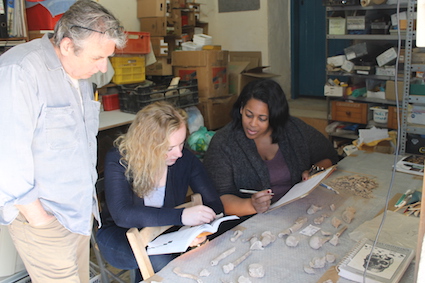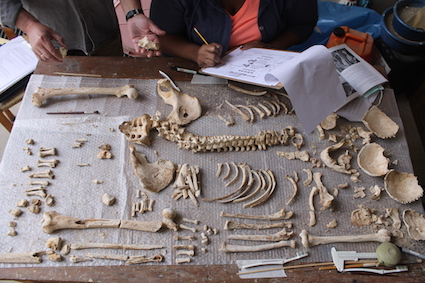Fieldwork
This listing expired on December 31, 2020. Please contact michelle@harparchaeology.co.uk for any updated information.


Location: Paphos Region, CY
Season: April 19, 2020 to May 2, 2020
Application Deadline: January 31, 2020
Deadline Type: Rolling
Website: http://www.harparchaeology.co.uk/field-schools/bioarchaeology-field-school-cyprus
Program Type:
Field School
RPA Certified:
No
Affiliation:
Heritage and Archaeological Research Practice (HARP)
Project Director:
Michelle Gamble (HARP)
Project Description:
HARP will be running a two-week human bioarchaeology field school from Sunday 19th April to Saturday 2nd May 2020. The field school is intended for those who have no prior experience with human remains, however we are happy to provide a more bespoke course for those with some previous human osteological experience (i.e. taken an introduction to osteology course) and who would like to expand upon this experience by working with archaeologically derived skeletal material.
This course aims to provide students with an interest in bioarchaeology with a hands-on experience of working with archaeologically-derived human skeletal material and will use Cyprus as a case study to discuss aspects of mortuary practice, taphonomy, and excavation and its impact on osteological analyses.
This course will include:
The field school will be based in the archaeologically rich Paphos District, just outside of Paphos city, and we will explore some of the local sites with guided tours, highlighting and discussing aspects of mortuary archaeology at each site. The skeletal material derives from excavations by the Institute of Archaeology, Jagiellonian University at the Paphos Agora, which is part of the UNESCO World Heritage Site of Nea Paphos. This is an opportunity to work with challenging, commingled and dis-articulated skeletal material from a unique and important Hellenistic and Roman period site.
Costs and Accommodation
There are two options available for this course:
A) £575 ($850 USD) per person: includes full bioarchaeological training as outlined above; camping accommodation at the Edgar Peltenburg Archaeological Research Centre; transport for all site visits; all meals on workdays (not including the weekend); and a final evening dinner. NB: Food preparation will take place at the accommodation by the participants, and dietary requirements can be accommodated.
B) £450 ($650 USD) per person: includes full bioarchaeological training as outlined above; transport for all site visits; lunch on workdays; and a final evening dinner. Suggestions for local accommodation can be provided upon request, but HARP takes no responsibility for any aspect of the accommodation or general subsistence.
Flights are not included in either option. A non-refundable 50% deposit is required within two weeks of being offered a place on the field school in order to secure it (otherwise your spot will be offered to another). A full list of suggested items to bring will be sent out upon an offer of a place on the course. Airport Transfers by local taxi (to be paid for by participant) can be arranged if required.
For more information or to request an application and email Michelle at michelle@harparchaeology.co.uk
Period(s) of Occupation: Hellenistic, Roman
Notes:
Provides a unique introduction to the study of human osteology
Project Size: 1-24 participants
Minimum Length of Stay for Volunteers: 2 weeks
Minimum Age: 18
Experience Required: No experience required
Room and Board Arrangements:
Camping accommodation is provided at the picturesque Edgar Peltenburg Archaeological Research Centre. The centre is where the course will be held and is centrally located in the middle of the village of Lemba, next door to the kafeneio (coffee shop) and the Lemba Pottery shop. Facilities include a toilet and shower block with hot running water and a kitchen for preparing meals. The centre is a short five-minute stroll away from a large supermarket and take-away establishments. It is also only 500m from the local sandy beach and coastal road, which has bars, restaurants and mini-markets. Tent plots will be provided on the flat roof of the building beneath the trailing grape vines, or in garden space behind the research centre. Mattresses will be provided but participants will need to bring their own bedding/sleeping bags. Due to the cooler spring time weather it is recommended that participants bring a tent (to be pitched on a flat roof, tents that don’t need to be pegged in place to stay up would be ideal). A full list of suggested items to bring will be sent out upon receipt of the deposit to secure your place.
Academic Credit:
No formal credit is offered but every participant will receive a checklist of skills which will be signed off over the course of the field school and will produce a skeletal report to add to their portfolio of work over the two weeks.
Michelle Gamble
H.A.R.P, 101 Rose Street South Lane
Edinburgh
EH2 3JG
United Kingdom
The AIA is North America's largest and oldest nonprofit organization dedicated to archaeology. The Institute advances awareness, education, fieldwork, preservation, publication, and research of archaeological sites and cultural heritage throughout the world. Your contribution makes a difference.
Notifications